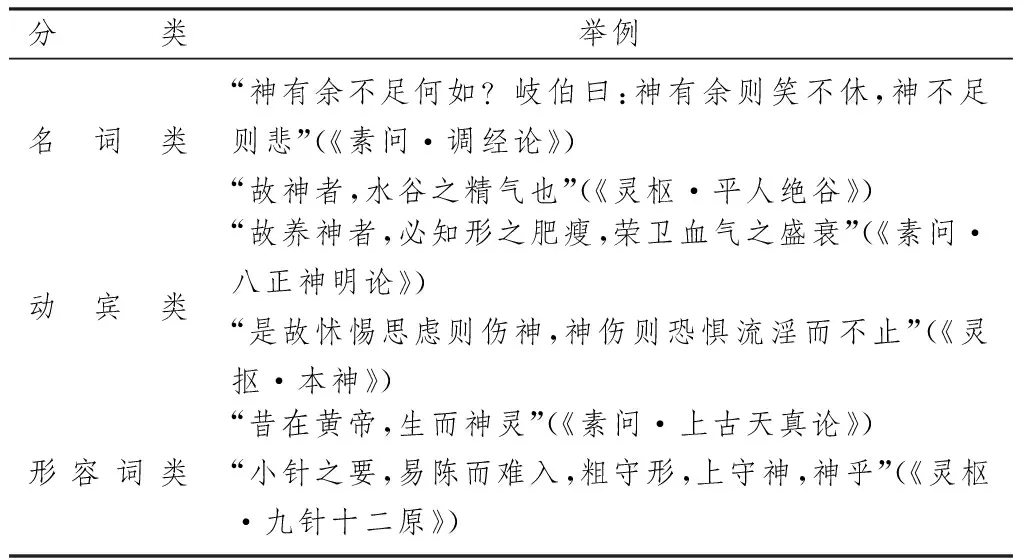《黄帝内经》核心文化术语“神”的词性分类与语境差异化英译研究❋
李 苹,张宗明
(1. 南京中医药大学中医文化研究中心,南京 210023; 2. 河南中医药大学外语学院,郑州 450008)
《内经》包括《素问》《灵枢》两大部分各81篇,是我国现存最早的较为系统和完整的中医典籍,集中反映了我国古代的医学成就,创立了中医学的理论体系,奠定了中医学发展的基础。“神”是中医文化中的重要概念,更是《内经》的核心文化术语,其内涵十分深奥和丰富。本文正是从理论和实际意义出发,分析《内经》中“神”的涵义,研究《内经》两个英译本对“神”的翻译策略,总结其中核心文化术语“神”的语境差异化翻译方法。
1 《内经》中“神”的涵义分析和词性分类
1.1 《内经》中“神”的涵义分析
有关对“神”的认识是人们在长期与疾病作斗争的过程中,摆脱了巫术的束缚而逐渐形成的。在此之前的“神”一直被认为是存在于自然之外的、具有人格、意识能够主宰物质世界的神灵[1]。受到当时朴素唯物主义的影响,《内经》坚持无神论的观点,提出“拘于鬼神者,不可与言至德”。《内经》中“神”的涵义非常丰富,大致有以下几种[2],一是神灵,二是自然规律,三是生命活动的总称,四是精神、意识、思维活动及情感变化,五是人体正气,六是人体的血气,七是水谷精气。
1.2 《内经》中“神”的词性分类
《内经》中共出现“神”190次[3]。为方便讨论“神”的翻译方法,根据“神”所在的具体语境和搭配的词语,将“神”分为名词类、动宾类和形容词类。名词类“神”一般位于句首多单独出现,也会搭配其他字构成特定的中医名词术语,如“神门”“神气”“神机”“神明”“神藏”等。动宾类“神”多位于句中,搭配的词汇多为“调神”“藏神”“养神”等。形容词类“神”较少多位于句末,表示“聪慧、聪明至极”或“深奥微妙,变化不测”。

表 1 “神”的分类及举例
2 《内经》英译本的选择
《内经》的翻译已有近百年的历史,翻译者有医史学家、从事中医的美籍华人、中医临床医生和中医翻译家等。译者或将《内经》作为中医学经典之作来译介,或着重体现它的医学价值,或向西方传播和推广中医,或全面再现它的文化、历史、哲学方面的价值,翻译结果已趋多样化[4]。选择的两部英译本一是伊尔扎·威斯Ilza Veith的TheYellowEmperor’sClassicofInternalMedicine(简称威译本),Ilza Veith翻译了《内经·素问》的前34章;二是李照国的全译本HuangdiNeijing-YellowEmperor’sCanonofMedicine(简称李译本)。选择这两部译本,是想比较在中西不同文化背景下,不同时期译者对《内经》核心文化术语“神”涵义的理解和翻译。
3 《内经》英译本中“神”的英译分析
3.1 形容词类“神”的英译分析
例1:昔在黄帝,生而神灵,弱而能言,幼而徇齐,长而敦敏,成而登天(《素问·上古天真论》)。
释义:远古时代的轩辕黄帝生来就非常聪明,幼小之时就善于言谈,年少时就思维敏捷,长大后敦厚勤奋,乃至成年便登上了天子之位[5]。
威译本:In ancient times when the Yellow Emperor was born he was endowed with divine talents; while yet in early infancy he could speak; while still very young he was quick of apprehension and penetrating; when he was grown up he was sincere and comprehending; when he became perfect he ascended to Heaven[6].
李译本:Huangdi, or Yellow Emperor, was born intelligent. He was eloquent from childhood. He behaved righteously when he was young. In his youth, he was honest, sincere and wise. When growing up, he became the Emperor[7].
分析:神灵:张介宾:“聪明之至也。”张志聪:“智慧也”,是非常聪明伶俐的意思。在此句中“神”为形容词,威斯将其翻译为名词“divine talents”,而李照国将其翻译为形容词“intelligent”,两位译者都很好地把握了“神”的含义,采取了意译的翻译方法,或保留形容词词性,或进行词性转换,将“神”的内涵翻译出来。
3.2 名词类“神”的英译举例分析
例2:拘于鬼神者,不可与言至德,恶于针石者,不可与言至巧(《素问·五藏别论》)。
释义:凡是迷信鬼神的人,是不能与其谈论至深的医学理论的。对那些讨厌针石治疗的人,也不可能与其谈论医疗技巧[5]。
威译本:Those who would restrain the demons and the gods (good and evil spirits) cannot attain virtue by speaking about it; and those who dislike acupuncture cannot achieve ingenious results by speaking about them[6].
李译本:Do not discuss medical theory with those who are superstitious; do not talk about the therapeutic skills with those who dislike acupuncture[7].
分析:此处“神”的涵义为神灵。威斯将其翻译为名词“demons and the gods (good and evil spirits)”,准确地传达了原义。李照国采用意译的方法,将其翻译为形容词“superstitious”,也很好地传达了原义。
例3:清阳上天,浊阴归地,是故天地之动静,神明为之纲纪(《素问·阴阳应象大论》)。
释义:阳气轻清而升于天,阴气重浊而降于地,天地的运动和静止是由阴阳的神妙变化来决定的[5]。
威译本:Yang, the lucid element, ascends to Heaven. Yin, the turbid element, returns to earth. Hence the Universe (Heaven and Earth) represents motion and rest, controlled by the wisdom of nature (the gods)[6].
李译本:The Lucid-Yang rises to the heavens and the Turbid-Yin descends to the earth. So the heavens and the earth follow the principles of Shenming (mysterious changes) to move or to maintain static[7].
分析:“神明”:变化不测谓之“神”,品物流形谓之“明”。能使万物显露形象和变化的巨大力量,称为“神明”。威斯采用意译的方法,将“神明”翻译为名词“nature (the gods)”。李照国采用音译加注释的方法,翻译为“Shenming (mysterious changes)”。
例4:食饮有节,起居有常,不妄作劳,故能形与神俱,而尽终其天年,度百岁乃去(《素问·上古天真论》)。
释义:饮食有一定的节制,起居有一定的时间,不做过分的劳作,所以能使形体与精神都互相协调健康,而活到其生命能够达到的年龄[5]。
威译本:There was temperance in eating and drinking. Their hours of rising and retiring were regular and not disorderly and wild. By these means the ancients kept their bodies united with their souls, so as to fulfill their allotted span completely, measuring unto a hundred years before they passed away[6].
李译本:[They were] moderate in eating and drinking, regular in working and resting, avoiding any overstrain. That is why [they could maintain a desirable] harmony between the Shen (mind or spirit) and the body, enjoying good health and a long life[7].
分析:在翻译名词类的“神”,威斯采用意译的方法,将“神”翻译为“souls”。 李照国采取音译加注释的翻译方法,将“神”译为“Shen (mind or spirit)”。
例5:血气者,人之神,不可不谨养(《素问·八正神明论》)。
释义:因为血气是人之神的物质基础,不可不谨慎的保养[5]。
威译本:Constitution and breath determine man’s spirit and energy and one should not be heedless of their nourishment and care[6].
李译本:Blood and Qi are the Shen (Spirit) of man and must be carefully cultivated[7].
分析:威斯采用意译的方法,将“神”翻译为“spirit and energy”。李照国采取音译加注释的翻译方法,将“神”翻译为“Shen (Spirit)”。
例6:神者,正气也。客者,邪气也(《灵枢·小针解》)。
释义:“神”指正气,“客”指邪气[8]。
李译本:Shen (Spirit) refers to Zhengqi (Healthy-Qi) and Xie (Evil-Qi)[8].
分析:李照国采取音译加注释的翻译方法,将“神”译为“Shen (Spirit)”。
例7:故神者,水谷之精气也(《灵枢·平人绝谷》)。
释义:因此,神气是由水谷精微之气所化生[8]。
李译本:That is why it is said that the Spirit is transformed from the nutrients of food[8].
分析:李照国采取意译的翻译方法,将“神”译为“Spirit”。
这里需要补充说明的是,因为威斯只翻译《内经·素问》的前34章,例6例7出自《内经·灵枢》,因此只列举了李照国的译文。
3.3 动宾类“神”的英译分析
例8:不知持满,不时御神,务快其心,逆于生乐,起居无节,故半百而衰也(《素问·上古天真论》)。
释义:不知道保持真元的充实,不善于统驭精神,只顾一时的快乐,违反正常的生活习惯。作息没有一定的规律,所以50岁左右就衰老了[5]。
威译本:They do not know how to find contentment within themselves; they are not skilled in the control of their spirits. They devote all their attention to the amusement of their minds, thus cutting themselves off from the joys of long (life). Their rising and retiring is without regularity. For these reasons they reach only one half of the hundred years and then they degenerate[6].
李译本:[They] seldom [take measures to] keep an exuberance [of Jingqi] and do not know how to regulate the Shen (mind or spirit), often giving themselves to sensual pleasure. Being irregular in daily life, [they begin to] become old even at the age of fifty[7].
分析:“不时御神”时,善也。御,统摄、治理的意思。“神”,就是精神、精力。“不时御神”即指不善于把握和调养精神的意思。
威斯根据语境,采用意译的方法将“不时御神”翻译为“they are not skilled in the control of their spirits”。 李照国主要采取音译加注释的翻译方法,译为“do not know how to regulate the Shen” (mind or spirit)。
4 《内经》英译本中“神”的英译策略分析
4.1 李译本中“神”的英译策略分析
在翻译名词类和动宾类“神”时,李照国主要采取音译加注释的翻译方法,译为“Shen”(mind or spirit)或“Shenming”(mysterious changes),或者转换词性意译为“superstitious”。在翻译形容词类“神”时,根据“神”所处的语境,保留形容词词性,将其翻译为“intelligent”。
《内经·素问》共出现“神”108次,李译本中翻译为“Shen”(Spirit)44次,翻译为“Shen”(mind or spirit)3次,翻译为“spirit”38次。由此可见,李照国在翻译“神”时以汉语拼音音译加注释和意译的方法为主。这种翻译方法可以保持译名的统一,而且注释随语境差异性而行,注释的内容是在具体语境中“神”的涵义解释,也可能是在较大程度上能体现文化术语“神”内涵的英译文[9]。但这种翻译方法的缺点是译语词汇相对较为繁琐,较之直译或意译连贯性不强,可读性较差。
4.2 威译本中“神”的英译策略分析
威斯认为,《内经》文化术语“神”的涵义丰富,不能简单翻译为God或god。因为God/god一词的主要含义为:1) The name God is given to the spirit or being who is worshiped as the creator and ruler of the world, especially by Jews, Christians, and Muslims.上帝;2) In many religions, a god is one of the spirits or being that are believed to have power over a particular part of the world or nature.神[10]。英语中并没有与“神”完全对应的词语。威斯在翻译名词类和动宾类“神”时,忠实于“神”的内涵,多采用意译的方法,将其翻译为“souls”或“mind”或“spirit”。个别情况下,根据语境将“神”直译为“demons and the gods”(good and evil spirits),或翻译为“nature” (the gods)。在翻译形容词类“神”时,结合语境和语义,威斯采用意译的方法,翻译为名词“divine talents”。
威斯在翻译“神”时以意译的方法为主,使用直译和意译的区分点,不如李译本中音译和意译的区分点明显,说明他没有在译语中刻意保留“神”的文化内涵,翻译等效性相对较差。威译本中对《内经》文化术语“神”的译文同一性低,在不同语境中,“神”的译语往往不同。
5 《内经》中“神”的语境差异化英译方法
5.1 使用既有的“普通语言对应词”
“普通语言对应词”就是沿用一般非专业人员所使用,其含义与原本中医术语的含义相符的词语,这一类的对应词又可分为自然性(natural)与等化性(adapted)[11]。
“自然对应词”就是指选来译解的这些英文词语,其所指的含义、现象对于英文语系的一般人而言,与中医原词语对于一般中国人而言并无二致。根据语境的差异化,可以选择相应的“自然对应词”。如在“拘于鬼神者”具体的语境中,“神”的含义为鬼神,就可以选用“自然对应词”翻译为“demons and the gods”。
“等化性对应词”就是指英文字面上原本的含义相等于对应的中医术语名词字面上的含义,此类英文对应词是较不严谨的,经过词汇化的过程,它们被用来表达中医原词的概念。如在多数语境下,“神”的含义为精神,就可以选用“souls”或“mind”或“spirit”。
5.2 借用汉语拼音音译加注释
“神”是中医特有的概念,在某些特定的语境下,无法找到精确的对应词进行翻译,此时可直接借用汉语拼音音译来翻译并加上注释,更易于译入语读者理解在差异化的语境中“神”的含义。如将“神”翻译为“Shen”(mind or spirit),“神明”翻译为“Shenming”(mysterious changes)。
5.3 词性转换法翻译
由于英汉两种语言的差异,为了使译文更加流畅自然,根据语境的差异性可以进行词性转换。如名词类“神”转换为形容词,在“拘于鬼神者”这一具体语境中,“鬼神”是名词,翻译时可以转换词性,翻译为形容词“superstitious”。 在“生而神灵”这一语境中,“神”为形容词,可以转换词性将其翻译为名词“divine talents”。
6 结语
《内经》中的“神”是中医哲学的精髓,也是中医文化最重要的核心术语之一。《内经》中“神”的含义丰富,根据词性不同可以分为名词类、动宾类、形容词类。通过比较不同文化背景译者所翻译的《内经》英译本,分析不同译本对中医文化核心术语“神”的翻译策略,从而根据《内经》中“神”所在的语境差异性给出具体的翻译方法,使用既有的“普通语言对应词”、借用汉语拼音音译加注释和词性转换法翻译。这种根据中医术语所在语境的差异性进行翻译的方法,对中医术语翻译具有重要而现实的指导意义。
参考文献:
[1] 王庆其,周国琪. 黄帝内经专题研究 [M]. 上海:上海中医药大学出版社, 2002: 78.
[2] 张登本.论《黄帝内经》“神”的内涵及其意义[J]. 中华中医药学刊, 2008, 26(9): 1866-1870.
[3] 张登本,武长春. 内经词典 [M]. 北京: 人民卫生出版社, 1990: 382.
[4] 邱玏.中医古籍英译历史的初步研究[D]. 北京:中国中医科学院,2011:146-147.
[5] 南京中医学院. 黄帝内经素问译释[M].3版.上海:上海科学技术出版社, 1997: 97.
[6] ILZA VEITH. The Yellow Emperor’s Classic of Internal Medicine [M]. Taibei: Southern Materials Center. Inc. 1982: 101-177.
[7] 李照国. 黄帝内经·素问Yellow Emperor’s Canon of Medicine Plain Questions [M]. 西安: 世界图书出版公司,2005: 2-895.
[8] 李照国. 黄帝内经·灵枢Yellow Emperor’s Canon of Medicine Spiritual Pivot [M]. 西安: 世界图书出版公司,2009: 50-474.
[9] 陈海燕.浅析中华思想文化术语翻译中的难点[J].中国翻译, 2015(5):13-17.
[10] JOHN SINCLAIR柯林斯.COBUILD高级英汉双解词典[M].北京:高等教育出版社,2009:481.
[11] Nigel Wiseman魏迺杰.英汉汉英中医词典English-Chinese Chinese-English Dictionary of Chinese Medicine[M].长沙:湖南科学技术出版社, 1995: 16-17.

